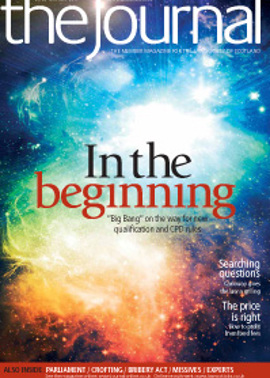CPD: a personal quest

Despite all the work put into the PEAT 1 and PEAT 2 schemes, for most solicitors already qualified it is the changes to the CPD rules that will affect them most directly.
Not that there should be any cause for alarm; quite the contrary. The bottom line is that the number of hours (a minimum of 20 each year) remains the same, but solicitors will be able to claim credit for a wider range of activities.
They will also find themselves focusing more clearly on their own training needs as individuals, and identifying for themselves the best means of meeting these – perhaps via routes that are good learning experiences but often not recognised as CPD potential at present.
As Liz Campbell puts it, "Twenty hours is the minimum requirement, and we stress minimum because it's not a target, it's a guide: the individual should undertake the amount of CPD that is relevant to their training and development needs. At the moment there are requirements about how much management should be undertaken, how much group study and the like, and even how much management has to be in group study, but those requirements will be relaxed from 1 November and a much wider range of activities can count."
Your personal plan
For the future, the only stipulation about how the 20 hours are made up is that at least 15 must be in verifiable activities – that is, those where some kind of certificate of attendance or participation is issued to support the entry on the CPD return. People will also have more flexibility especially with online training, as to which the guidelines are very restrictive at present. From 1 November that activity will be regarded as valid provided it can be verified, for example via a certificate or email confirming that the programme has been completed.
How should you go about planning your personal learning? "Solicitors should be thinking at the start of the CPD year about what their development needs are for the year", says Campbell. "They may be practising in an area where they know the law is going to change, and have to be updated on what those changes are: that would be a valid training need. They may be going to practise in an area of law that's new to the firm, or that they haven't had much experience in. They may be taking on new responsibilities within the firm: managing staff for the first time, supervising a trainee, becoming risk management partner, money laundering officer, and have training needs around that.
"So at the start of the year, engage in some thinking about your needs, prepare a plan of how you might meet those needs, and that plan can also be flexible during the course of the year. If something new comes up it can be added in; if something is no longer needed it can be removed."
Having undertaken a CPD activity, she adds, you should also spend some time evaluating what you have learned from it. How will you use that new knowledge? Do you need to change behaviours as a result? If you have acquired a new skill, how will you put it into practice? "That planning and doing and reviewing activity should be captured by the solicitor and there will be an online section of the record where they will have a template to do that."
Making a case
So what can you actually count towards your CPD? Rob Marrs offers the example of the recent SYLA lecture given by Lord Hope of Craighead. "Two solicitors said to me afterwards, I'm going to some CPD sessions next week. I said this surely should be able to count towards your CPD. They asked how, because it wasn't provided by certain organisations and it wasn't labelled as CPD, and I said, well this is one of the Supreme Court judges telling you how law is judged from outside Scotland, how the elements of the law came about, most notably the Cadder case, and I think that could reasonably be considered to be part of your continuing professional development. Equally our election hustings, asking cabinet secretaries and potential future cabinet secretaries what their views are regarding the changes that they wish to make or are considering making. Sometimes solicitors do loads of things that they don't actually consider to be CPD."
Other examples could be getting instruction on a new computer system to help you run your office, or preparing materials if you act as a university tutor.
Marrs adds: "If you do one-to-one coaching within the firm, as many firms do and is often the very best way to learn, that could be counted in the verifiable hours if for example you have a programme of getting a certain amount of coaching when you reach certain levels within the firm. If that's set down and verifiable and recorded as part of the process, there is no reason at all why that could not count. So again hopefully this makes things easier for solicitors rather than harder."
In a nutshell, if something is relevant to your development, you should be doing it. But is there any risk that people will claim for something as CPD and the Society then decides it doesn't count?
"What they will have to do as part of their evaluation is make a case for themselves and how that has benefited them in terms of business or professional development", says Campbell. "As at present we will continue to check a sample of about 5% each year, so records will be called on for 5% of the profession on an annual basis. And if a solicitor is found to have falsified that return in some way, whether including something that is patently irrelevant or in not being able to verify attendance, the procedure will be followed in relation to the fact that they haven't complied with sufficient CPD.
"It shouldn't be about the Society policing solicitors, who are professionals and who should be capable of being trusted to take care of their own development: it's about giving the profession control of their development, so they can say as individuals, as firms, as a profession collectively that they can demonstrate what they do to maintain their competence. So obviously there has to be some element of monitoring by the Society, but we want solicitors to seize control of their development and not do CPD because the Society says they have to do it or because there is a box to be ticked but because there is a developmental process."
Message to the public
Marrs comments: "The overwhelming majority of solicitors already do more CPD than they need to under the regulations, and the overwhelming majority do it within the spirit of those regulations and will continue to do so. We can't for fairly obvious regulatory reasons say, well you can just do 20 hours' private study; the very small number that do abuse the system would take advantage of that. But I think the message is that the profession is already doing very well. We want them to do as well and better in the future, but we also must be able to show the public how well the profession is doing."
One point to look out for relates to the planning aspect. Whereas at the moment it is possible, if you have already completed your CPD hours by October in a given year, to carry forward any CPD done in October into the following year, or conversely to carry back any hours done in November in order to complete your 20 for the previous year, that will cease to be an automatic right. Campbell explains: "That doesn't sit comfortably with planning or with undertaking relevant CPD: if it's relevant to your development it's relevant regardless of the time of year. There may be occasions where individuals will have to make that request because of unforeseen circumstances, but it will not exist as an automatic right."
Marrs emphasises that the purpose of planning is maintaining competence as well as projecting to the wider world that the profession's standards are high. "Hopefully it will become more relevant to solicitors' needs; hopefully they will get more from their CPD; hopefully that will help them develop as professionals. Hopefully, and I don't want to beat about the bush about this, it will help them make more money."
In this issue
- Experience not to be missed
- Call in the experts
- Planning to deliver
- Stars of the future
- Registered Paralegal Scheme hits the mark
- CPD: a personal quest
- Wha's like us?
- Holyrood: a verdict
- Public ethos
- Power in name only?
- From the Brussels office
- Minority voices
- Law reform update
- Quinn Direct - when to intimate?
- Name your price
- Ask Ash
- Communication breakdown - a major risk issue
- Interested parties
- Support from afar
- Plus ça change?
- Where the state has to stop
- A NEST egg?
- Scottish Solicitors' Discipline Tribunal
- Website review
- Book reviews
- Above board
- Ruaig an Fhèidh
- The price of breach






